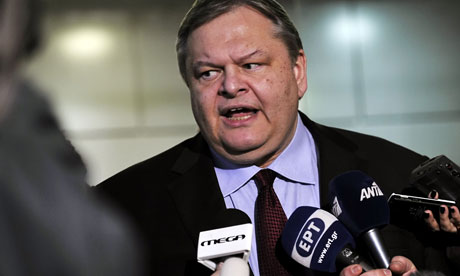Ian Traynor in Brussels and Larry Elliott
guardian.co.uk, Wednesday 15 February 2012 20.40 GMT
Greek finance minister says troika is shifting terms of €130bn bailout deal as part of move to force country out of eurozone
Greece's finance minister, Evangelos Venizelos, said: 'There are many in the eurozone who don't want us anymore.' Photograph: Louisa Gouliamaki/AFP/Getty Images
Greece rounded bitterly on its EU paymasters when the finance minister and socialist leader, Evangelos Venizelos, accused the eurozone of deliberately changing the terms of a proposed €130bn (£110bn) bailout because key players wanted to kick the country out of the single currency.
The charge that some eurozone countries were seeking to engineer a Greek sovereign default and exit from the euro deepened the rancour between debtor and creditors in the dangerous standoff."There are many in the eurozone who don't want us any more," Venizelos declared at a meeting with President Karolos Papoulias. "We are constantly being given new terms and conditions."
Papoulias went even further, denouncing Germany and Greece's north European creditors after Wolfgang Schäuble, the German finance minister, said that Greece must not turn into a "bottomless pit" for eurozone bailout funds and that Europe was better prepared than when the crisis erupted two years ago to cope with a Greek sovereign default.
"Who is Mr Schäuble to ridicule Greece? Who are the Dutch? Who are the Finns?" declared the Greek head of state. "I don't accept insults to my country by Mr Schäuble."
The bad-tempered rhetoric came as Greece's political leaders sought to assuage Berlin and Brussels by delivering on key conditions for release of the €130bn bailout, the second in two years, which takes Greece's rescue fund to €240bn.
Venizelos claimed the crucial debt swap with the banks – which technically requires three weeks to organise – will be announced on Monday provided the eurogroup signs off on the bailout.
The accord has to be in force well before 20 March when Greece is due to redeem €14.5bn of debt or face default.
Iran threatened to add to Greece's economics woes when Tehran said it was prepared to cut off oil supplies to six European countries in retaliation for Europe's latest sanctions. The price of crude jumped by a dollar a barrel to just over $118 after the ambassadors from Netherlands, Greece, France, Portugal, Spain and Italy were warned of the possible consequences of the actions that the EU has announced in an attempt to prevent Iran developing nuclear missiles.
Tehran was suspected of sabre-rattling, with analysts noting that Iran could ill afford to lose oil revenues from its six biggest customers.
Western policymakers are, however, concerned that the standoff could lead to dearer energy, hitting the global economy at a vulnerable time.
Sir Mervyn King, governor of the Bank of England, identified Europe as the biggest threat to the UK's still- faltering recovery from the 2008-09 recession but added that an oil shock from Iran had the potential to raise inflationary pressure.
Admitting that the Bank had made contingency plans against a worsening eurozone crisis, he said: "The biggest risk to the recovery stems from developments in the euro area, where there remain concerns about the indebtedness and competitiveness of some member countries."
In Athens, George Papandreou, leader of the socialist Pasok party, sent a signed pledge to respect the bailout terms after elections in April, although reports that the bailout could be delayed hit the euro.
His conservative counterpart, Antonis Samaras, who had been backing away from such a commitment, did likewise but appeared to reserve enough wiggle room to walk away from the promise.
Papandreou's task was easier since his party has slumped in the polls whereas Samaras is tipped to be next prime minister overseeing a eurozone-dictated austerity package that is hugely unpopular and which triggered riots in Athens.
Key players in the Greek debt drama made it clear the ball was in Athens' court and there would be no bailout unless Greek leaders met the terms: giving political pledges that rescue provisions were irreversible, regardless of a democratic vote in April, and that a funding gap of €325m in the €3.3bn austerity package be filled. Venizelos told reporters on Wednesday that both demands had been met.
Samaras's letter said that if his party, New Democracy, "wins the next election in Greece, we will remain committed to the programme's objectives, targets and key policies." But his pledge was conditional: he reiterated that he was of a mind to try to renegotiate the package.
"Policy modifications might be required to guarantee the full programme's implementation," he said. "We intend to bring these issues to discussion along with viable policy alternatives."
The "programme" of cuts has been scripted by the troika of the European commission, the European Central Bank and the International Monetary Fund.
Eurozone finance ministers had been scheduled to meet on Wednesday night to finalise the complex bailout, which, as well as the €130bn and the Greek austerity measures, entails a debt swap accord with Greece's private creditors writing down €100bn.
The meeting was called off because of the stalemate and ministers instead conferred by video ahead of a meeting scheduled for Monday.
Jean-Claude Juncker, prime minister of Luxembourg and head of the eurozone group of finance ministers, said later that he was confident the necessary decisions would be taken then.
"Further technical work between Greece and the troika has led to the identification of the required additional consolidation measures of €325m and the establishment of a detailed list of prior actions together with a timeline," said Juncker.
Given the uncertainties over the bailout and the febrile political atmosphere in Greece, frantic alternative narratives were being plotted. The overall bailout could be postponed until after the April elections have settled the political situation.
Greece is being forced out of eurozone, Venizelos claims | World news | The Guardian
![The [Greek] European Tragedy](https://blogger.googleusercontent.com/img/b/R29vZ2xl/AVvXsEiWKI5s90SFm1wWTk6bs4p7CgslaC2SnYPsrZhb-B-smOufNNCSxCvpBLI9hOB-LsXZjir_PNmEiMk2-E62F3xkg96IoC6QFAaZAnPRTVH340IN9WBRmWJqPkjWlgyRj3zpALp7h6hvA58/s920/GkBack_new.jpg)
